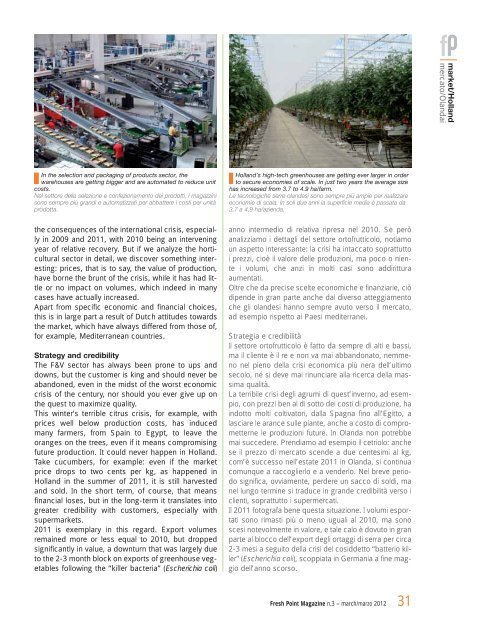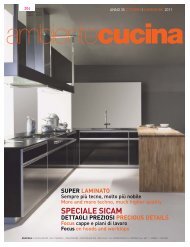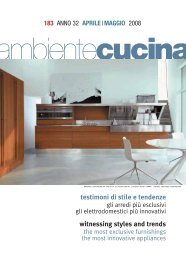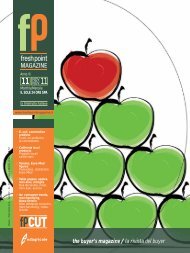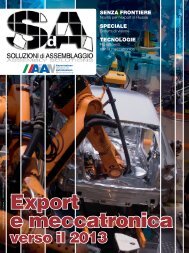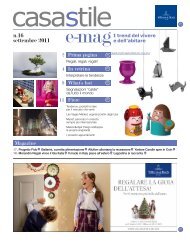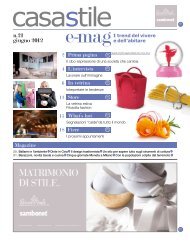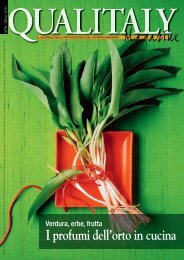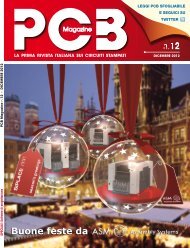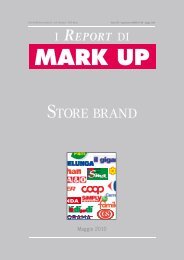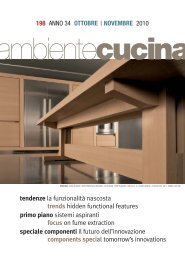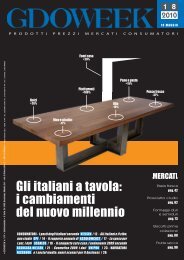Fresh Point Magazine - B2B24 - Il Sole 24 Ore
Fresh Point Magazine - B2B24 - Il Sole 24 Ore
Fresh Point Magazine - B2B24 - Il Sole 24 Ore
Create successful ePaper yourself
Turn your PDF publications into a flip-book with our unique Google optimized e-Paper software.
In the selection and packaging of products sector, the<br />
warehouses are getting bigger and are automated to reduce unit<br />
costs.<br />
Nel settore della selezione e confezionamento dei prodotti, i magazzini<br />
sono sempre più grandi e automatizzati per abbattere i costi per unità<br />
prodotta.<br />
the consequences of the international crisis, especially<br />
in 2009 and 2011, with 2010 being an intervening<br />
year of relative recovery. But if we analyze the horticultural<br />
sector in detail, we discover something interesting:<br />
prices, that is to say, the value of production,<br />
have borne the brunt of the crisis, while it has had little<br />
or no impact on volumes, which indeed in many<br />
cases have actually increased.<br />
Apart from specific economic and financial choices,<br />
this is in large part a result of Dutch attitudes towards<br />
the market, which have always differed from those of,<br />
for example, Mediterranean countries.<br />
Strategy and credibility<br />
The F&V sector has always been prone to ups and<br />
downs, but the customer is king and should never be<br />
abandoned, even in the midst of the worst economic<br />
crisis of the century, nor should you ever give up on<br />
the quest to maximize quality.<br />
This winter’s terrible citrus crisis, for example, with<br />
prices well below production costs, has induced<br />
many farmers, from Spain to Egypt, to leave the<br />
oranges on the trees, even if it means compromising<br />
future production. It could never happen in Holland.<br />
Take cucumbers, for example: even if the market<br />
price drops to two cents per kg, as happened in<br />
Holland in the summer of 2011, it is still harvested<br />
and sold. In the short term, of course, that means<br />
financial loses, but in the long-term it translates into<br />
greater credibility with customers, especially with<br />
supermarkets.<br />
2011 is exemplary in this regard. Export volumes<br />
remained more or less equal to 2010, but dropped<br />
significantly in value, a downturn that was largely due<br />
to the 2-3 month block on exports of greenhouse vegetables<br />
following the “killer bacteria” (Escherichia coli)<br />
Holland’s high-tech greenhouses are getting ever larger in order<br />
to secure economies of scale. In just two years the average size<br />
has increased from 3.7 to 4.9 ha/farm.<br />
Le tecnologiche serre olandesi sono sempre più ampie per realizzare<br />
economie di scala. In soli due anni la superficie media è passata da<br />
3,7 a 4,9 ha/azienda.<br />
anno intermedio di relativa ripresa nel 2010. Se però<br />
analizziamo i dettagli del settore ortofrutticolo, notiamo<br />
un aspetto interessante: la crisi ha intaccato soprattutto<br />
i prezzi, cioè il valore delle produzioni, ma poco o niente<br />
i volumi, che anzi in molti casi sono addirittura<br />
aumentati.<br />
Oltre che da precise scelte economiche e finanziarie, ciò<br />
dipende in gran parte anche dal diverso atteggiamento<br />
che gli olandesi hanno sempre avuto verso il mercato,<br />
ad esempio rispetto ai Paesi mediterranei.<br />
Strategia e credibilità<br />
<strong>Il</strong> settore ortofrutticolo è fatto da sempre di alti e bassi,<br />
ma il cliente è il re e non va mai abbandonato, nemmeno<br />
nel pieno della crisi economica più nera dell’ultimo<br />
secolo, né si deve mai rinunciare alla ricerca della massima<br />
qualità.<br />
La terribile crisi degli agrumi di quest’inverno, ad esempio,<br />
con prezzi ben al di sotto dei costi di produzione, ha<br />
indotto molti coltivatori, dalla Spagna fino all’Egitto, a<br />
lasciare le arance sulle piante, anche a costo di comprometterne<br />
le produzioni future. In Olanda non potrebbe<br />
mai succedere. Prendiamo ad esempio il cetriolo: anche<br />
se il prezzo di mercato scende a due centesimi al kg,<br />
com’è successo nell’estate 2011 in Olanda, si continua<br />
comunque a raccoglierlo e a venderlo. Nel breve periodo<br />
significa, ovviamente, perdere un sacco di soldi, ma<br />
nel lungo termine si traduce in grande credibilità verso i<br />
clienti, soprattutto i supermercati.<br />
<strong>Il</strong> 2011 fotografa bene questa situazione. I volumi esportati<br />
sono rimasti più o meno uguali al 2010, ma sono<br />
scesi notevolmente in valore, e tale calo è dovuto in gran<br />
parte al blocco dell’export degli ortaggi di serra per circa<br />
2-3 mesi a seguito della crisi del cosiddetto “batterio killer”<br />
(Escherichia coli), scoppiata in Germania a fine maggio<br />
dell’anno scorso.<br />
<strong>Fresh</strong> <strong>Point</strong> <strong>Magazine</strong> n.3 – march/marzo 2012<br />
31<br />
market/Holland<br />
mercato/Olandai


